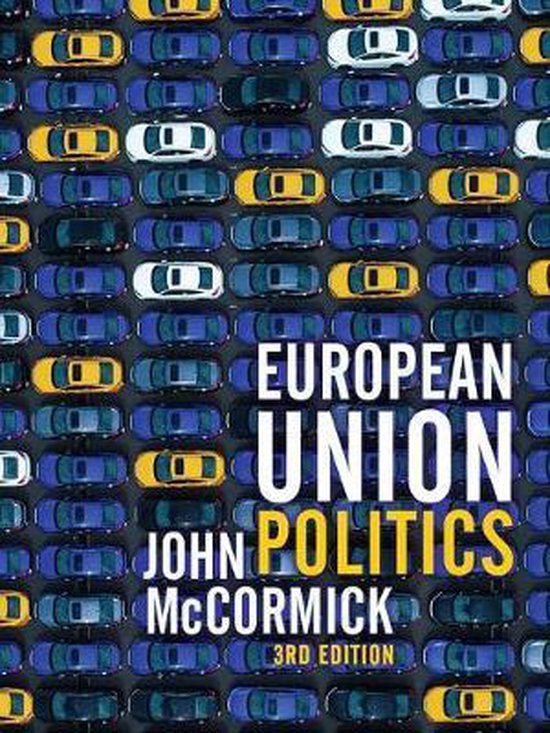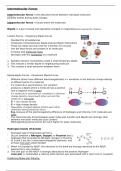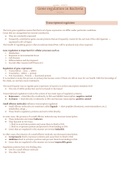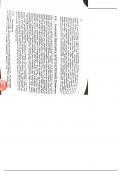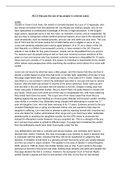What is the European Union?
- Let’s identify the ‘UPO’ (= Unidentified Political Object).
- Jacques Delors= (President of the European Union in 90’s) seen as weak and
a bureaucrat. But he changed the EU, pushed forward the EU integration.
Europe and integration
o Nation (you cannot completely identify the EU as a nation) = community
whose members identify with each other based on shared identity
(culture, history, language, myths, religion, territory, symbols, and
ancestry).
§ Symbols in the EU: flag, hymns, common history (wars), the
Euro (with bridges that don’t exist to avoid conflict)
o State= a legal and political arrangement through which all large-scale
political communities are organized, combining government population,
legitimacy, territory, and sovereignty.
è Westphalian system: Westfaalse soevereiniteit, of
staatssoevereiniteit, is een principe in het internationaal recht dat
elke staat exclusieve soevereiniteit heeft over zijn grondgebied.
• Examples in the EU; borders, border guards, EU
citizenship.
§ Many people that are negative about integration state the EU is a
super state, a monstrous bureaucracy which tries to control our
lives.
o Federation= a system of administration involving two or more levels of
government with autonomous powers and
responsibilities.
§ Some sort of central government. (Stronger than
confederation).
§ Elections for EU and nation.
• States are the member states.
• Central government are the institutions.
§ If you identify it as a federation, you are
classifying the EU in the way British people hate.
§ Monnet-method: the creation of the European Coal and Steel
Community as a first step towards more integration on other
areas, with the eventual achievement of a European federation.
(If you don’t have coals and steel, you can’t start a war because
you can’t make weapons for example -> integration).
§ Altiero Spinelli, criticism: no political center or leadership to push
this ‘method’ along. All structure, no agency.
, • It will only be structures if you don’t have the people to
believe in the structures and vote.
o Confederation (The book categorizes the EU as a
confederation) = a group of sovereign states with a central
authority deriving its authority from those states, and
citizens linked to the central authority through the states in
which they live.
§ The Eu parliament isn’t that powerful. The core is
through the authorities. The parliament can’t overrule the
member states.
o International organization= a body set up to promote cooperation
between or among states, based on the principles of voluntary
cooperation, communal management, and shared interests
§ In general, the EU isn’t seen as an international organization
anymore. It has too much power on the EU level and can too
often make sure majority member states rule over a minority in
member states to push forward stuff.
§ Member states lost sovereignty too gain other stuff, such as an
internal market. They will lose certain rights, but they gain
economic wealth on other points.
- The EU isn’t a federation but also not a full confederation. One of these
two, but there is a debate.
What is it?
- The EU as a political system: multi-level governance. (It is about governance,
not government).
- Government <-> Governance.
- Government: idea that EU institutions constitute a level of authority above that
of the member states, and that they have powers to make laws and drive the
political agenda
- Governance: arrangement in which laws and policies are made and
implemented because of interactions among a complex variety of actors,
including member state governments, EU institutions, interest groups and
other sources of influence.
o Broader set of actors than government.
o You look at relationships that aren’t hierarchically ordered.
o A negotiated order and not defined by formalized legal framework.
o Political game.
- Let’s identify the ‘UPO’ (= Unidentified Political Object).
- Jacques Delors= (President of the European Union in 90’s) seen as weak and
a bureaucrat. But he changed the EU, pushed forward the EU integration.
Europe and integration
o Nation (you cannot completely identify the EU as a nation) = community
whose members identify with each other based on shared identity
(culture, history, language, myths, religion, territory, symbols, and
ancestry).
§ Symbols in the EU: flag, hymns, common history (wars), the
Euro (with bridges that don’t exist to avoid conflict)
o State= a legal and political arrangement through which all large-scale
political communities are organized, combining government population,
legitimacy, territory, and sovereignty.
è Westphalian system: Westfaalse soevereiniteit, of
staatssoevereiniteit, is een principe in het internationaal recht dat
elke staat exclusieve soevereiniteit heeft over zijn grondgebied.
• Examples in the EU; borders, border guards, EU
citizenship.
§ Many people that are negative about integration state the EU is a
super state, a monstrous bureaucracy which tries to control our
lives.
o Federation= a system of administration involving two or more levels of
government with autonomous powers and
responsibilities.
§ Some sort of central government. (Stronger than
confederation).
§ Elections for EU and nation.
• States are the member states.
• Central government are the institutions.
§ If you identify it as a federation, you are
classifying the EU in the way British people hate.
§ Monnet-method: the creation of the European Coal and Steel
Community as a first step towards more integration on other
areas, with the eventual achievement of a European federation.
(If you don’t have coals and steel, you can’t start a war because
you can’t make weapons for example -> integration).
§ Altiero Spinelli, criticism: no political center or leadership to push
this ‘method’ along. All structure, no agency.
, • It will only be structures if you don’t have the people to
believe in the structures and vote.
o Confederation (The book categorizes the EU as a
confederation) = a group of sovereign states with a central
authority deriving its authority from those states, and
citizens linked to the central authority through the states in
which they live.
§ The Eu parliament isn’t that powerful. The core is
through the authorities. The parliament can’t overrule the
member states.
o International organization= a body set up to promote cooperation
between or among states, based on the principles of voluntary
cooperation, communal management, and shared interests
§ In general, the EU isn’t seen as an international organization
anymore. It has too much power on the EU level and can too
often make sure majority member states rule over a minority in
member states to push forward stuff.
§ Member states lost sovereignty too gain other stuff, such as an
internal market. They will lose certain rights, but they gain
economic wealth on other points.
- The EU isn’t a federation but also not a full confederation. One of these
two, but there is a debate.
What is it?
- The EU as a political system: multi-level governance. (It is about governance,
not government).
- Government <-> Governance.
- Government: idea that EU institutions constitute a level of authority above that
of the member states, and that they have powers to make laws and drive the
political agenda
- Governance: arrangement in which laws and policies are made and
implemented because of interactions among a complex variety of actors,
including member state governments, EU institutions, interest groups and
other sources of influence.
o Broader set of actors than government.
o You look at relationships that aren’t hierarchically ordered.
o A negotiated order and not defined by formalized legal framework.
o Political game.


